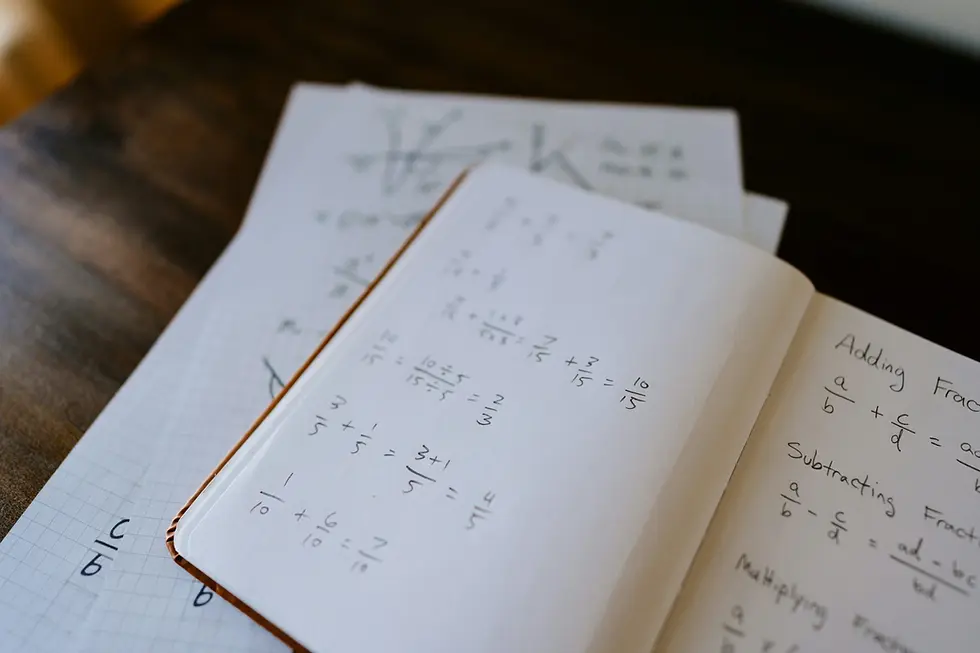How to Be Better at Math: Tips That Actually Work
- Sep 3, 2025
- 4 min read

Math can feel like a mountain sometimes. You sit down to solve a problem, and suddenly you’re wondering why is math so hard in the first place. The truth is, math is like learning a new language: it takes practice, patience, and the right strategies. If you’ve been asking yourself how to be better at math, you’re in the right place. This guide is packed with math tips that actually work, whether you’re in middle school, high school, or college.
Why Does Math Feel Hard?
Before diving into strategies, let’s look at why math feels intimidating for so many students. Unlike reading a story or writing an essay, math builds on itself. If you missed something early on, like fractions, decimals, or basic algebra, it can make later topics significantly more challenging.
That’s why many students develop a fear of math, and that fear makes them shut down before they even try. The good news? You can rebuild your confidence step by step. Even if you think you’re “bad at math,” the truth is you just need the right approach.
How to Be Better at Math

If you want to improve at math, consider it like building muscle. You don’t get stronger overnight; it takes regular training. The same goes for math. Practicing a little bit each day makes a huge difference.
Start small by brushing up on simple math skills. Things like multiplication tables or fractions might seem basic, but being quick with them makes advanced topics way less stressful. Once you’re comfortable, you can move into more challenging material like algebra, geometry, or calculus with confidence.
Another key strategy is learning how to study math the right way. Unlike history or English, where you can read and memorize, math is all about solving problems. So instead of just watching someone else solve an equation, grab a notebook and try it yourself. Practice is the only way to really understand.
If you’re wondering, “How do you study for math test situations?”, the trick is to go beyond reviewing notes. Work through different kinds of problems so you’re ready for anything your teacher throws at you. Repetition helps you recognize patterns, which is the secret behind solving math problems quickly and accurately.
How to Build Smart Study Habits for Long-Term Success
If you’re serious about figuring out how to learn mathematics, you need solid study habits. Here are a few practical approaches that can help you stay on top of things:
Self-Study and Independent Practice

Even if you’re not in class, you can always self study mathematics at home. There are tons of free resources online: tutorial videos, practice worksheets, and even apps. The key is to stay consistent. Whether it’s 15 minutes a day or an hour a few times a week, steady practice adds up.
Many students also ask: Is it possible to do effective self-study math without a teacher? The answer is yes, but it’s even more effective when you combine self-study with guidance from someone experienced. That way, you don’t waste time stuck on the same problem.
Preparing for Exams the Right Way
If you’re stressing about how to study for a math exam, focus on practice tests. Take old quizzes, mock exams, or worksheets and time yourself. This helps you get used to the pressure while also finding areas you need to improve. The more problems you solve before test day, the calmer you’ll feel when it counts.
Taking Notes That Actually Help
One of the most overlooked strategies is knowing how to take notes for math. Unlike other subjects, you can’t just jot down a few sentences. Good math notes should include worked-out examples, key steps, and formulas written in your own words. That way, when you review later, you’ll actually understand what you wrote.
Getting Ahead and Gaining Confidence

Maybe you’re in high school and wondering how to get ahead in math in high school before college. Or maybe you’re already in college and asking yourself, “Is college math hard?” Either way, the approach is the same: consistent practice and seeking help when needed.
If you’re looking for how to improve math skills beyond the basics, challenge yourself with extra problems outside of homework. Try puzzles, online math games, or even real-life applications like budgeting and sports statistics. Math becomes easier when you see it everywhere.
Sometimes the fastest way forward is working with someone who knows the shortcuts and can explain things clearly. That’s where a tutor makes all the difference. For example, if you’re in California, working with a tutor in Orange County can give you personalized strategies to master tough topics and gain confidence.
Final Words: Math is Learnable
At the end of the day, the secret behind improving at math isn’t about being a “genius.” It’s about consistent practice, building strong habits, and asking for help when you need it. Whether you’re tackling basic fractions or advanced calculus, you can learn at your own pace.
So stop asking yourself if you’re just “bad at math.” With the right mindset and tools, you can turn it into one of your strongest subjects. And remember, every time you solve a problem correctly, you’re proving to yourself that progress is possible.
Ready to boost your confidence in math? Book a session with a math tutor at Total Tutors today and get personalized strategies that make numbers finally click.










Comments